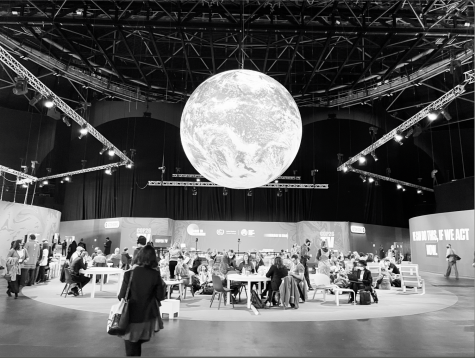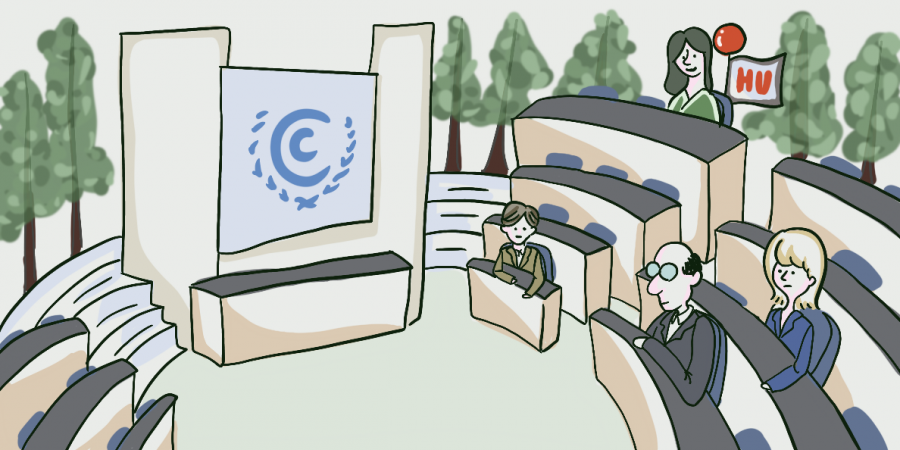Hamline professor at the UN
November 17, 2021
Assistant Professor of Environmental Studies Patty Born recently returned from Scotland where she attended the UN’s climate change conference.
This conference happens annually where the Conference of the Parties (COP) gathers to pledge to reduce gas emissions in order to slow the effects of climate change. The Parties are groups, usually countries or environmental organizations that are able to participate in negotiations. The conference this year was a major one where the leaders reconvened to reflect upon the changes since the Paris Climate Accords in 2016.
Born attended the conference for eight days, each day doing a COVID-19 test and submitting her negative test results before being able to leave her hotel. Thousands of people attended the event and even more gathered on the streets of Glasgow outside in protest.
In order to be able to attend an event such as this, one needs to be nominated. They are given a badge by an organization that has observer status, Born was given one by The School of Environmental Studies. Born taught there previously and the school wanted to send someone with an educational background so the person could bring back what they learned to help improve their curriculum.
While in attendance at this event, Born did her best to pick meetings and press conferences that focused on issues of education, climate justice, indigenous peoples, nature and land use.
One of the most powerful meetings that Born attended was “UK COP Presidency dialogue with Indigenous Peoples.” In this, leaders from tribes and groups from around the world talked about the importance of indigenous voices in climate justice. The leaders who spoke were, in order of when they spoke, Rodion Sulyandziga from the Centre for the Support of the Indigenous Peoples of the North, a group supporting the Indigenous peoples of Russia, Fawn Sharp President of the National Congress of American Indians, Gideon Abraham Ole Sanago from Community Research and Development Services the Tanzanian Maasai people, Tuntiak Katan of the Global Alliance of Territorial Communities and Coordination of Indigenous Organizations of the Amazon Basin and Shuar people of Ecuador and Peru, Dalee Sambo Dorough of the Inuit Circumpolar Council and a Native Alaskan Inuit, Ghazali Ohrella Indigenous rights advocate from the Maluku Islands in the Pacific, and Victoria Tauli Corpuz of the Tebtebba Foundation and the Kankanaey people of Northern Phillipines.
These communities have generations of knowledge of human/land relationships and they are often the most affected and least heard in discussions about these issues.
Oftentimes, Indigenous voices are cut out and ignored in the discussion of climate change. Not a single Indigenous tribe or group from anywhere in the world has party status at this conference, meaning that they are not able to be heard in negotiations held within the conference.
Specifically, anyone without a party status could not be present at the negotiations that took place this year. This was due to COVID-19 safety restrictions, but many people claimed that this decision went against the UN’s commitment to transparency.
Another part of the conference that was very powerful and hopeful to Born was a panel of youth from around the world. They had their own list of demands that they wish the COP and UN to pledge to uphold in the future. At the center of many of the youths’ demands were the fact that indigenous and human rights need to be at the center of these climate discussions.
“Their voices made me feel very hopeful,” Born said. “As well was extremely eye opening for me.”
As these negotiations were occurring inside, outside on the streets was the largest protest in Scotland’s history. Thousands upon thousands flooded the streets demanding that the leaders be held accountable to the pledges that they make, believing that the UN and world leaders need to get their act together and do more to prevent the world temperature from rising any more.
“We have reached a climate tipping point and this was supposed to be where countries set very achievable and measurable goals for reducing emissions, already thousands of people have died due to climate change,” Born said.
As of writing on November 12, the conference has been extended, this extension was made because points established at the start had not yet been agreed on yet. These points include financing less developed nations in order to help them recover from the impacts of climate change, pledging to incorporate climate and environmental education in schools. Parties needed to set measurable goals to monitor their progress in lessening gas emissions, and unfortunately Born feels that none of the pledges were strong enough to get the global temperature to that we need it to be. But a few countries are committing and establishing a curriculum that includes environmental studies at every level of education so that everyone is aware of how they can help impact the planet.
“For me as an educator, there was a lot of hope. Hearing about the need for education and focus in every single sector and level of education.” Born said.
Within these commitments to including environmental curriculums and initiatives, Born feels that Hamline is doing very well compared to other universities.
For information about the conference and what the UN does go to
https://unfccc.int/climate-action/global-climate-action-at-cop-26


